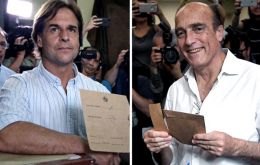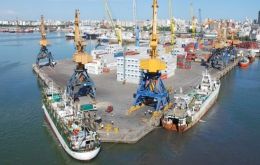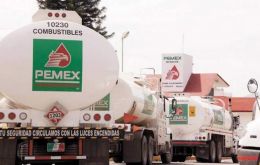MercoPress. South Atlantic News Agency
Stories for November 23rd 2019
-
Saturday, November 23rd 2019 - 09:59 UTC
Uruguay Sunday's presidential runoff, a multicolor power switching with strong winds of change

This Sunday 2.7 million Uruguayans will cast their ballots in the presidential runoff, which according to all opinion poll forecasts, will have Luis Lacalle Pou, the leader of an opposition multicolor alliance as head of the Executive next March, but equally significant, power switching, it will mark the end of fifteen years of almost undisputed predominance of a catch-all coalition, Broad Front, which ruled South America's smallest country for three consecutive five-year mandates.
-
Saturday, November 23rd 2019 - 09:51 UTC
The Economist and Chile: the painful birth of a different country

In 2014, Michelle Bachelet a Socialist swept into Chile’s presidency for a second time on a program of radical reform of tax, education and pensions. She also aspired to enact a new constitution that would guarantee “more balance between the state, the private sector and society”, as she told your columnist over tea at the Moneda presidential palace. She argued that her “struggle against inequality” was the last chance to deal with discontents that, if neglected, could push Chile towards populism.
-
Saturday, November 23rd 2019 - 09:33 UTC
Swiss investigation helps expose corruption network involving Vitol, Trafigura and Petrobras

Swiss investigators have executed search warrants at addresses linked to Vitol and Trafigura, their counterparts in Brazil said on Thursday, as a sprawling probe into the global commodity trading industry intensifies.
-
Saturday, November 23rd 2019 - 09:23 UTC
Another major haul of cocaine in the port of Montevideo: three tons headed for the Canary Islands

Uruguayan authorities this week confiscated over three tons of cocaine from an Africa-bound rice container in the port of Montevideo. The container was originally from Paraguay and was set to stop in Tenerife, the largest of Spain's Canary Islands off West Africa, before finally arriving in Cotonou, in southern Benin, the National Customs Directorate said in a statement.
-
Saturday, November 23rd 2019 - 09:11 UTC
Police officers killed in a bomb blast at Colombian police station

Three police officers were killed in a bomb blast late Friday at a police station in Colombia after thousands gathered for renewed protests and sporadic looting erupted in the capital of Bogota.
-
Saturday, November 23rd 2019 - 09:04 UTC
Mexico's giant Pemex, remains world's most indebted oil company

A Mexican government energy policy that gives more weight to state oil company Pemex could cause private sector investment to fall, an analyst with credit ratings agency Standard & Poor’s said on Friday.
